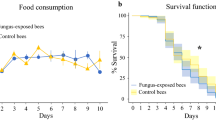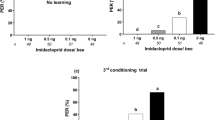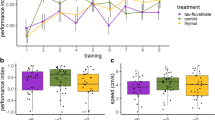Abstract.
The present study was designed to examine the effects of endosulfan, decis, baytroid, and sevin on the learning ability of Africanized honey bees (Apis mellifera L.). Although these insecticides were recommended by the government of Brazil to control the cotton boll weevil, the effects on bees have been unknown. Results of the present research show that: (1) bees readily consume each of the pesticides when placed in a sucrose solution; (2) the odors of the pesticides are not repellent to bees, and such odors can serve as conditioned stimuli; (3) learning occurs to various degrees when the insecticides are combined with the sucrose solution and used as an unconditioned stimulus; and (4) feeding the insecticides to the bees 1 h prior to conditioning leads to differing mortality. Because of the importance of bees for honey production, as well as pollination of cotton and other crops, recommendations are made for the use of decis and other measures for boll weevil control.
Similar content being viewed by others
Author information
Authors and Affiliations
Additional information
Received: 20 August 1998/Accepted: 22 May 1999
Rights and permissions
About this article
Cite this article
Abramson, C., Aquino, I., Ramalho, F. et al. The Effect of Insecticides on Learning in the Africanized Honey Bee (Apis mellifera L.). Arch. Environ. Contam. Toxicol. 37, 529–535 (1999). https://doi.org/10.1007/s002449900548
Issue Date:
DOI: https://doi.org/10.1007/s002449900548




